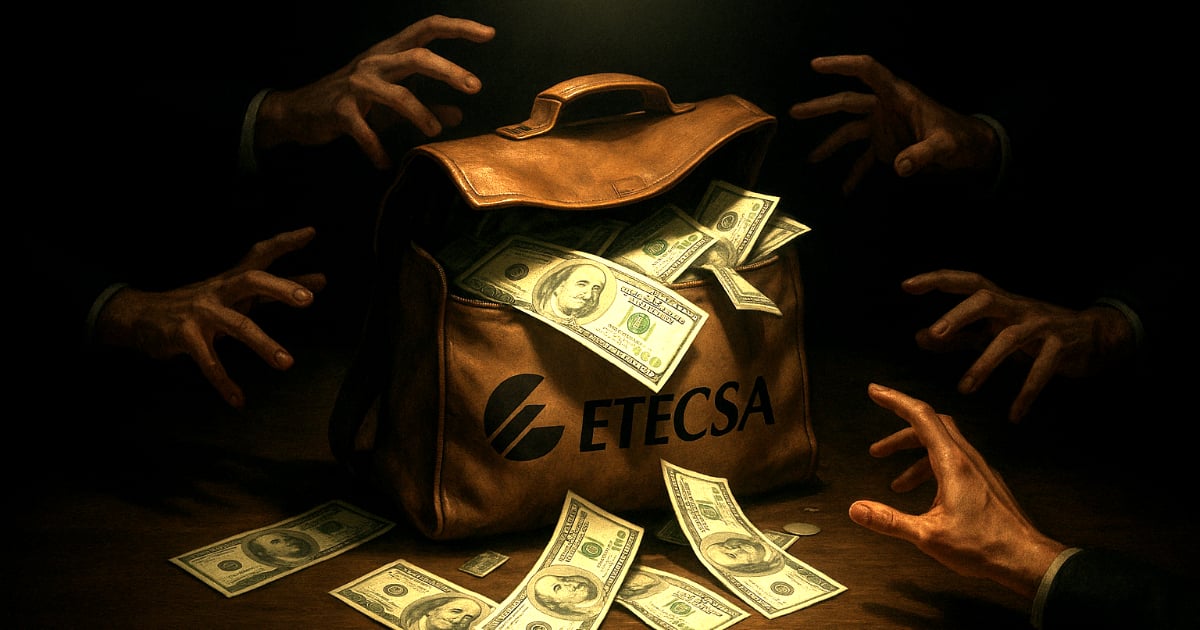The recent price hike by ETECSA has sparked widespread outrage among Cubans both on the island and abroad. The Cuban regime justified this move by citing alleged "external frauds" that supposedly resulted in a 60% revenue loss for the state-run company. However, the lack of public investigations and transparency, coupled with the timing of certain strategic decisions, suggest this is yet another chapter in the state's currency capture process, possibly under Russian advisement and with privatization goals in mind.
A Deceptive Narrative of Fraud
Since May 30th, ETECSA has capped national top-ups to a mere 360 Cuban pesos monthly, forcing users to purchase packages in dollars for basic connectivity. On June 1st, Tania Velázquez Rodríguez, the executive president of ETECSA, made an urgent appearance on national television to justify the measure, claiming that "over 60% of the revenue from abroad" was lost due to fraud in international top-ups.
Velázquez explained that these frauds occur through unofficial platforms selling top-ups in hard currency, activating them in Cuban pesos on the island, while keeping the money outside the country. She argued this has severely undermined ETECSA's revenue and worsened its already critical operational situation.
Pre-Constructed Fraud Allegations
The fraud narrative was not a spontaneous reaction to the price hike. As early as May 2024, ETECSA had been publicly denouncing these schemes, warning about their impact on the company's revenue. By the following year, the figure was inflated to 60%, seemingly laying the political and media groundwork for the new measures. This progression indicates calculated action by the regime rather than a reactionary stance.
Socialist Enterprise or Power Tool?
While the government insists that ETECSA is "a socialist state company, of the people and for the people," the reality contradicts this claim. Decisions regarding tariffs, access, and the company's structure are made without public consultation or accountability. In 2019, ETECSA's first vice president, Reinaldo Rodríguez, declared the company belonged to the people. Yet today, it marginalizes those without access to dollars or remittances, focusing its commercial strategy on capturing foreign currency.
Fraud or Corruption Scheme?
The "massive fraud" argument is difficult to sustain. No company globally would allow 60% of its revenue to be stolen without launching investigations, filing complaints, or sanctioning those responsible. The absence of legal action by ETECSA or the regime suggests another possibility: that these alleged frauds were a parallel marketing scheme tolerated or even facilitated by the company itself to capture unreported currency.
Several private and opaque platforms offered data packages in dollars and euros through unofficial channels. ETECSA materialized the top-ups in Cuban pesos, maintaining a system of accounting that was never transparently audited. The fraud narrative might be hiding a corrupt mechanism of currency extraction benefiting those close to power.
Monopoly Extension: A Step Towards Privatization?
Just days before the price hike, the Cuban government extended ETECSA's monopoly until 2036, with the possibility of a further three-decade extension. This decision, far from strengthening the company's "socialist" nature, consolidates a legal framework that could facilitate its future privatization under monopoly conditions or limited competition.
It's not just about maintaining control but legally securing a strategic asset for a future opaque transfer of ownership or management. This pattern dangerously mirrors the privatization process in Russia during the 1990s under Boris Yeltsin's presidency, where state enterprises were handed to oligarchs aligned with power through corrupt schemes like "loans for shares."
Moscow's Guiding Hand in Cuba's Economic Shift
For at least two years, Russian experts have been advising the Cuban regime on economic transformation. Boris Titov, a Kremlin commissioner, has advocated for moving away from the socialist model towards market reforms. Under his leadership, a Joint Center for Economic Transformation was established in Havana to convert state companies into commercial entities.
Simultaneously, Cuba has offered lands to Russia for a 30-year usufruct, solidifying an asymmetric relationship that includes technical and economic assistance. This geopolitical framework supports the hypothesis that ETECSA's price hike is not an isolated measure but part of a broader experiment: dollarizing public services, restricting basic rights like connectivity, and laying the foundation for transferring state assets to regime-loyal elites under a business facade.
Emotional Blackmail of the Cuban Diaspora
ETECSA is aware that a significant portion of its revenue comes from international top-ups paid by the Cuban diaspora. By limiting internet access in Cuban pesos, the regime forces those living abroad to financially support their families on the island under the threat of disconnection. This is emotional blackmail disguised as an economic model.
In a context of increasing social tension, blackouts, inflation, and latent protests, controlling digital connectivity becomes a political deterrent. The summer of 2025 will test the public's ability to resist and organize against a state that uses its "people's companies" against the populace itself.
In conclusion, ETECSA's price hike is not the result of fraud; it is a deliberate strategy to capture currency, restrict rights, and redesign the Cuban economic model without transparency. In the name of the people, the regime operates behind their backs. While selling the narrative of economic siege, it reconfigures the country to consolidate a state-controlled capitalism overseen by the power elites and Moscow.
Frequently Asked Questions about ETECSA's Price Hike
Why did ETECSA increase its prices?
ETECSA cited alleged external frauds for the price increase, claiming a 60% revenue loss. However, the lack of transparency and public investigations suggests other motives like currency capture and economic restructuring.
What is the impact of ETECSA's new policy?
The new policy restricts national top-ups to 360 Cuban pesos monthly, forcing users to buy dollar-based packages for basic connectivity, which mainly affects those without access to foreign currency.
Is there a connection between ETECSA's actions and Russian influence?
Yes, Russian experts have been advising the Cuban regime on economic transformation, and recent developments suggest a potential shift towards a state-controlled capitalism influenced by Moscow.
